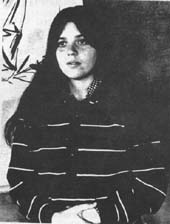|
She had become very frustrated with
Judaism and disillusioned about the youth federation; neither went far enough.
Her search for peace and meaning became the major objective of her life. At that
time, together with some close friends, she applied for and received a grant
from a private foundation and opened a school for ghetto children. The
thirty-six kids that attended gave her a real education. She saw how the
children were trapped and molded by their environment even at the young age of
eight, and had her ideas and ideals about education severely tested. It was one
of the most difficult undertakings she had ever experienced, but the school was
a success, and she and her friends learned a lot about teaching in the process.
In
the summer she came down with a severe case of mononucleosis, and was terrified
at the prospect of a long illness. Her brother again helped her by teaching her
to recite the Great Compassion Mantra. In less than three weeks she was well.
She didn't know what to think about this, and it caused her to wonder and
investigate Vajra Bodhi Sea. As a result she gave up eating meat in spite
of the fact that she hated vegetables. She went to Kirkland College, a small,
old, isolated school in upper New York State--no grades, no exams, lots of
innovation. She liked the school, but didn't dig the artistic elitism and the
all night parties. She found a friend, a disciple of Kirpal Singh, and began
learning how to meditate, and her fascination with religions opened up again as
she looked to the East for a way to wisdom and release from suffering. The idea
of karma began to make sense, as did the principle that all living beings have
the same enlightened nature at their source. Fascinated with what people call religion, she decided to major in
religious studies. She had seen that there is something in all religions, the
sacred wisdom that transcends the boundaries of dogma. But in a philosophy
course called "The Problem of Evil," she couldn't help stumbling over
the Western concept of God, an almighty, theoretically benevolent, all knowing
being who let his children suffer. This didn't make sense; the evil in the world
could not be reconciled to "things that passeth understanding." It was
obvious to her that Christianity is just the lack of a better answer. She wanted
to solve the problems of life now. She found that the more she studied Buddhism,
the more sense it made. There w/nothing "beyond understanding," and
because all beings inherently have complete wisdom; good and evil, no longer
absolute, ceased to be obstacles as she realized that the Buddha-nature is
neither good nor bad.
After
much deliberation she took a leave from Kirkland and enrolled in a work/study
program at Gold Mountain. She thought that there would be a lot of pressure on
her but found that she was able to work at her own rate, and allowed to develop
her own natural abilities. Nobody forced her to do anything. She felt very much
at home, and strangely drawn to the Venerable Abbot, and got herself involved in
various temple projects that suited her. She
wrote afterwards: "To my surprise everyone seemed to think it was fine if I
was interested and fine if I wasn't. However, I found myself immediately feeling
at home and very drawn to the Abbot. In fact, a few days after I arrived I
attended a taking refuge ceremony and was very much torn between wanting to take
refuge and knowing that it was too soon. Two months later, glad that I had
waited, because I understood more about what it meant to be a Buddhist disciple,
I did take refuge. I spent most of those six months attending the Abbot's
lectures (I only missed one or two), auditing a Chinese class, proofreading,
editing, and typing. Though I had never been able to read Vajra Bodhi Sea very
well, once I arrived here I couldn't put it down and read the first 58 issues in
about a month. To fulfill the written part of my work-study protect I wrote two
papers. One was a basic introduction to Gold Mountain, explaining ceremonies,
the Buddha Hall, etc. The other, a more detailed explanation of how to perform
specific ceremonies and offerings.
Before
I took refuge I had read in Vajra Bodhi Sea about all the people who had seen
the Abbot emitting bright light and various other miraculous happenings and I
wanted something special to happen to me so that I would know for sure that he
is my teacher. But then I began to realize that everything about the Master is
special. There are many people in the world who can emit lights and manifest
spiritual powers, but few if any have a heart of compassion and wisdom as great
as our Master's. In fact, just to have the opportunity to draw near to him is a
rare privilege. When I realized these things, there was no doubt in my mind that
he was my teacher."
Kuo
Ts'an is currently a senior in religious studies at University of California,
Santa Barbara. She is also working on classical and modern Chinese so that in
the future she will be able to help in the translation of Buddhist texts and the
Master's commentaries. |
